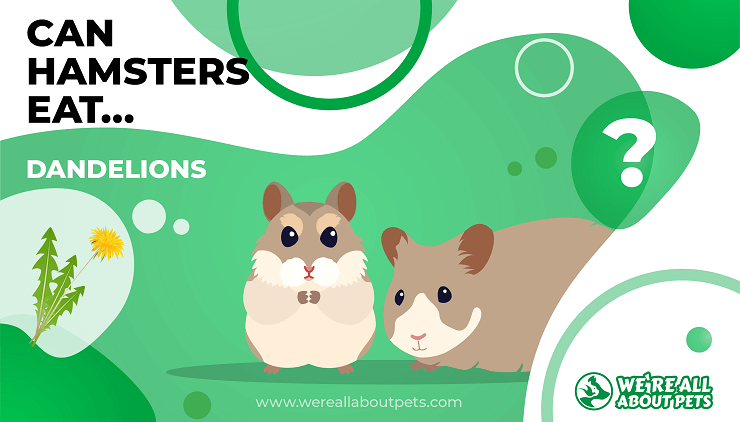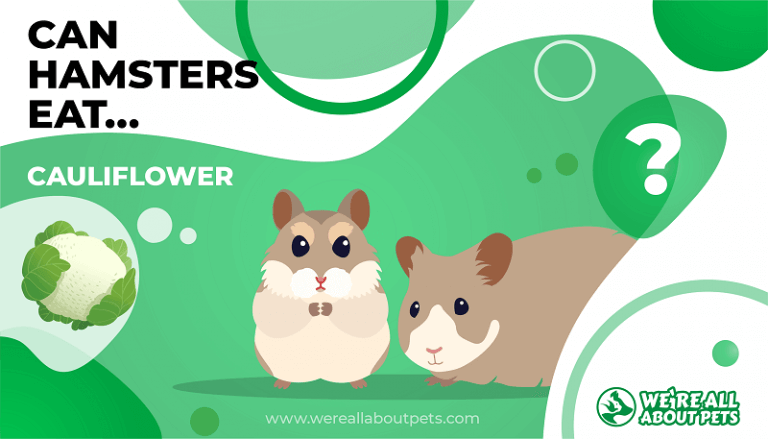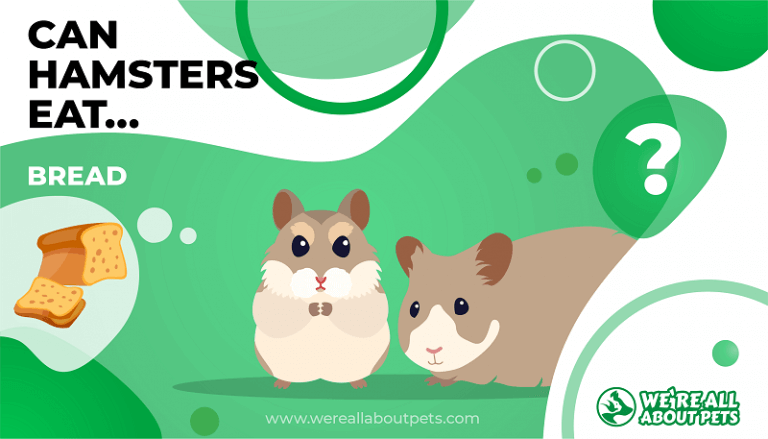Can Hamsters Eat Marigolds?
This page contains affiliate links. We may earn money or products from the companies mentioned in this post through our independently chosen links, which earn us a commission. Learn More
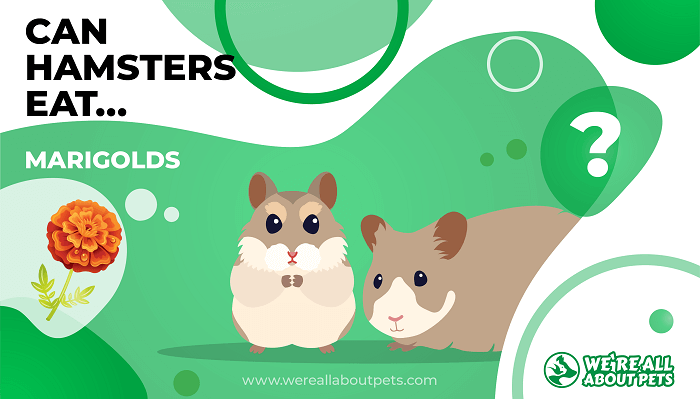
Marigolds make a gorgeous addition to your garden and they offer the advantage of keeping certain pests at bay. Certain types of marigold are also categorized as edible flowers, leading many pet parents to ask whether it’s ever OK to feed a hamster marigolds.
So, can hamsters have marigolds? If so, what kind are OK, and what kind are best avoided? How much marigold can a hamster have?
Stick with us! Our quick guide contains all the information you need to know about marigolds for hamsters.
Can Hamsters Have Marigolds?
Imagine how cute your hamster would look eating a marigold! We have some good news for you: certain marigolds are OK for hamsters, meaning that you can set up an adorable photoshoot if you want.
The bad news is, not all marigolds are edible and certain ones can be toxic to your pet.
The standard marigolds found in most gardens – the ones with fluffy petals and a strong scent – are French marigolds. These are the type you’ll see most often at nurseries and other stores that sell garden plants . Unfortunately, they are also the kind that you’ll want to keep out of your hamster’s hands. Another variety, Marsh marigolds, are also toxic to pets.
If you want to feed your hamster marigolds, look for wild marigold, which is more often sold as calendula. Calendula has Long, straight pedals and a daisy-like shape. The scent is milder than that of French Marigold and if you ever taste the two, you’ll find that calendula has an appealing floral flavor, while French Marigold has a strong taste that most people find unpleasant.
Be absolutely certain that you offer only organic calendula (wild marigold) to your hamster. Conventionally grown varieties are often treated with chemical fertilizers and pesticides, which can be harmful to your pet. If the flowers are fresh rather than dried, give them a quick rinse before feeding them to your hamster.
Are Marigolds Good For Hamsters?
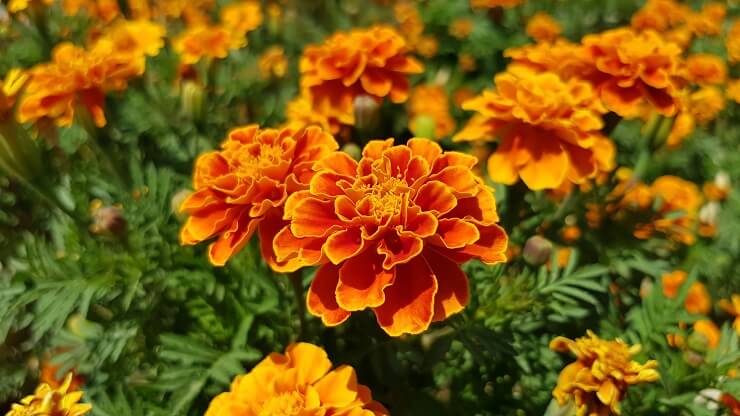
Hamsters thrive on a diverse diet, meaning yes, if you offer the right kind of marigold (calendula only!) your hamster might get a few extra antioxidants to benefit their overall wellbeing.
Do Hamsters Like Marigolds?
We’ve met hamsters that like marigolds, along with some that turned their noses up at the opportunity to eat a few calendula petals. The best way to find out if your hamster likes marigolds is to offer them a few little pieces of a calendula flower, then stand back and see what happens.
How Much Marigold Can A Hamster Eat?
Wild marigolds (calendula) don’t contain many calories, and they’re not high in sugar , meaning that your hamster can enjoy a fairly substantial serving size if they like the way this flower tastes.
Here’s how much marigold to feed your hamster:
| Age | Amount |
| Baby hamster | None |
| Adult hamster | 1 large marigold or 2 small marigolds |
Even though calendula is a very mild herb, you’ll still want to follow all the rules for introducing new foods to hamsters. If your hamster already eats lots of different greens, herbs, and veggies, then you can go ahead and offer them half the recommended serving size , meaning one small Marigold or half a larger flower.
If your hamster doesn’t consume lots of fresh foods, offer them just a quarter of the recommended serving size, meaning half a small Marigold or a quarter of a large flower.
Either way, you’ll want to spend the next 12 hours or so keeping an eye out for signs of digestive distress, including diarrhea. So long as everything is normal, you can give them a full serving of Marigold next time it’s on their menu.
How Often Can A Hamster Eat Marigolds?
If you’re growing wild calendula in your garden, or if you happen to have a good source for organic calendula, your hamster is in luck! They can enjoy a little bit of this flower up to three times per week, along with their hay or other fresh foods.
Just remember that hamsters like variety and offering a rotating menu that includes lots of different foods is a good way to round out their nutrition and help them live their healthiest lives.
The Correct Diet Is Important

It’s very important to offer your hamster a diet that’s fairly close to what they’d eat in the wild – at least from a nutritional standpoint. You might be surprised to discover that hamsters are omnivores. They eat lots of different plant material, along with small amphibians, insects, and even worms.
While your hamster will certainly appreciate treats such as freeze-dried mealworms or crickets, there’s no need to offer these items since high-quality hamster food is nutritionally complete. Of course, offering lots of variety helps keep your hamster happy in an enclosed habitat.
With your pet’s health and well-being in mind, here’s what we recommend feeding your hamster every day:
- Fresh hay such as Timothy, which contains lots of fiber to keep their digestive system healthy. Hay complements your hamster’s bedding as well, and it’s fantastic for tunneling projects. If you’re looking for an easy way to enrich your hamsters environment, offering hay is one of the simplest ways to accomplish this goal.
- A daily serving of high-quality hamster food is essential. Be sure to check the label for the correct serving size based on your pet’s size and life stage.
- A 24/7 supply of fresh, clean water. Be sure to rinse and refill their drinking bottle at least once per day.
- Occasional protein treats such as dried mealworms are optional but appreciated. You can give your hamster tiny bits of hard-boiled egg, very small bits of natural cheese, or even a tiny piece of cooked chicken.
- Birdseed as a source of healthy fat – no more than about a teaspoon per week, and only if your hamster’s food doesn’t contain seeds.
- Tiny bits of fresh fruit and vegetables; check each new item for safety and to ensure that you’re offering an appropriate serving size.
- Chewable hamster toys, which are essential for your preventing your hamster’s teeth from becoming overgrown, painful, and perhaps even infected.
Since hamsters are hoarders, be sure to offer only as much fresh food as they can eat within the span of a single nibbling session. Removing any leftovers keeps them out of your hamster’s food caches. Leaving them in place can lead to spoilage and mold, potentially harming your pet’s health.
What Are Other Healthy Alternatives To Marigolds In A Hamster’s Diet?
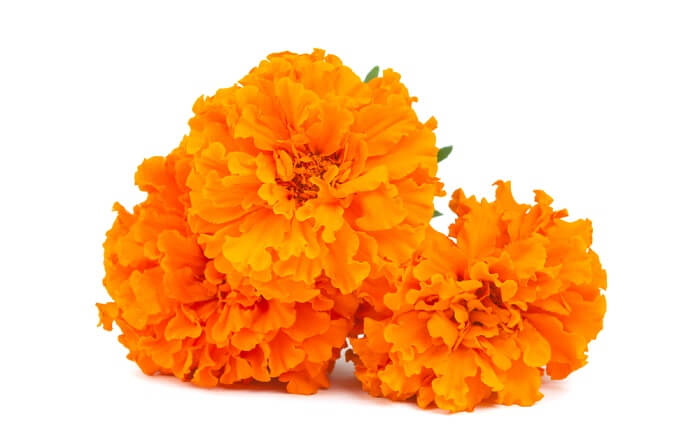
Hamsters love a wide variety of veggies, herbs, and fruits. There are plenty of natural treats to choose from, and your adorable fluffball will appreciate all those exciting flavors.
Try some of these hamster-approved veggies next time you’re searching for a safe, yummy treat:
- baby corn
- artichoke
- asparagus
- sweet corn
- basil
- cabbage
- parsley
- cilantro
- mint
- carrot
- carrot tops
- potato (cooked only)
- romaine
- beets
- beet tops
- arugula
- rocket
- sprouts
- swiss chard
- endive
- spinach
- escarole
- bibb lettuce
- buttercrunch lettuce
- red lettuce
- cucumber
- celery
- green beans
- winter squash
- summer squash
- bell pepper
- pumpkin
- zucchini
- sweet potato
- parsnip
- broccoli
- broccolini
- tomato
- okra
- yu choy
- bok choy
- cauliflower
- watercress
This is only a partial list: After all, there are hundreds of different veggies and fruits to try! Remember to research all new foods (even the ones listed here) to get important safety information and to find the correct serving size.
For now, giving your hamster marigolds (just calendula or pot marigold) is a wonderful way to add interest to their diet.
Frequently Asked Questions
Are marigolds safe for hamsters?
Yes! It’s perfectly safe to give a hamster marigolds, so long as they’re pot marigolds (calendula) and not French marigolds or Marsh marigolds. Also, remember to offer only organic varieties that haven’t been treated with chemical pesticides, herbicides, or fertilizers.
Can marigolds make my hamster sick?
Marigolds (even the safe variety also known as calendula) might give your hamster diarrhea if overeaten. Other types of marigold including French Marigold and Marsh Marigold can make your hamster sick. Be certain that you’re offering the right plant before treating your hamster to marigolds.






